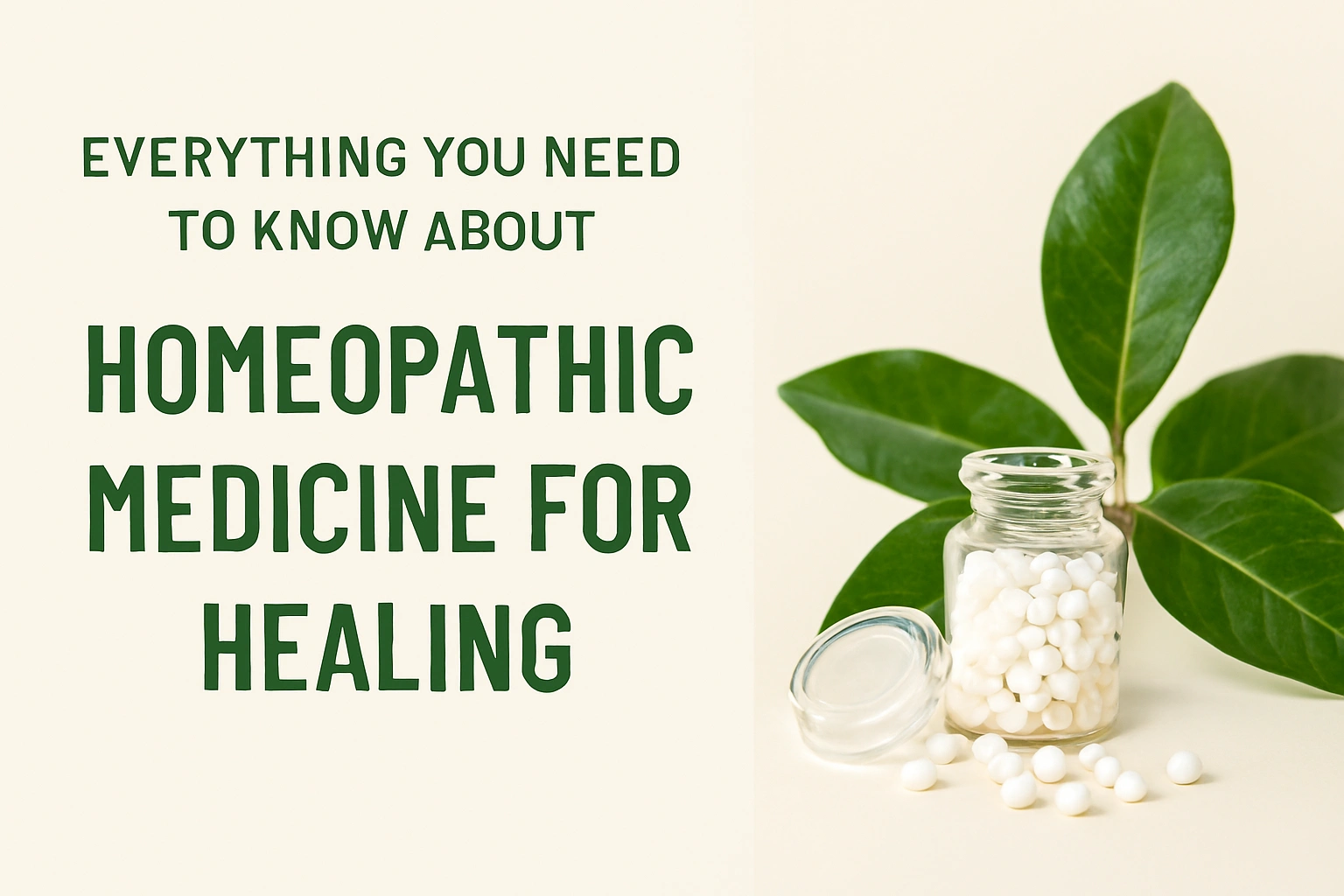Homeopathy is often met with skepticism, but could it be the solution you’re searching for in your journey toward healing? Whether you’re struggling with chronic conditions or simply seeking a holistic way to manage your health, homeopathic remedies may offer an alternative approach that addresses the root causes of your ailments, not just the symptoms.
In this ultimate guide, you will discover everything you need to know about homeopathic medicine—how it works, its benefits, the common misconceptions, and how it can be integrated into your lifestyle for better health. By the end, you’ll understand how homeopathy might be able to complement traditional treatments or even provide an alternative for various conditions.
What Exactly is Homeopathic Medicine?
Homeopathy is a system of alternative medicine that originated in the late 18th century with the German physician Samuel Hahnemann. It operates on the principle of “like cures like,” which suggests that substances that cause symptoms in a healthy person can, in diluted forms, treat those same symptoms in an ill person.
Key Principles:
- Law of Similars: This is the foundation of homeopathy. A substance that produces symptoms in a healthy person can help cure those symptoms in a sick person.
- Minimum Dose: Homeopathic remedies are highly diluted to avoid any potential side effects. The idea is that the more diluted the substance, the more potent it becomes in stimulating the body’s healing response.
- Holistic Approach: Homeopathy considers the entire person—mind, body, and emotions—rather than just the disease or condition. It’s about restoring balance to the body and its natural healing capacity.
Common Remedies
Some of the most popular homeopathic remedies include:
- Arnica Montana: Used for pain relief and to reduce bruising and inflammation.
- Oscillococcinum: Commonly used to alleviate flu-like symptoms.
- Nux Vomica: Often recommended for digestive issues or when dealing with hangovers.
Power Gold Tonic
How Does Homeopathic Medicine Work?
You might be wondering: how can a highly diluted substance have any effect on the body? The answer lies in the concept of “potentization,” a process in which the substance is diluted and shaken vigorously. This shaking, called “succussion,” is believed to imprint the healing properties of the substance into water or alcohol.
The Healing Process:
- Stimulating Vital Force: Homeopaths believe that the body has an innate “vital force” or energy that can be restored when it’s imbalanced. Homeopathic remedies are thought to stimulate this force to promote healing.
- Personalized Treatment: One of the key features of homeopathy is its individualized approach. Treatment is based not just on the disease, but on the overall symptoms, emotional state, and lifestyle of the individual. For example, two people with a cold may receive completely different remedies depending on their specific symptoms, personality, and overall health.
Case Study: Arnica for Bruising
When used in the early stages of bruising, Arnica Montana has been shown to speed up the healing process and reduce swelling. Many people report significant pain relief, with the bruise healing faster than expected.
Can Homeopathy Treat Chronic Conditions?
Homeopathy is often used to treat chronic conditions that traditional medicine might only be able to manage symptomatically. While it is not meant to replace conventional medical treatment, many individuals have found relief from conditions like:
- Allergies
- Asthma
- Eczema and other skin disorders
- Migraines
- Chronic pain
- Digestive issues
Pro Tip: Combine with Conventional Treatments
Homeopathy can complement traditional treatments by helping the body handle stress, manage side effects of prescription drugs, or address underlying issues that might not be addressed by conventional medicine. Always consult with both your homeopath and your doctor for the best approach.
Is Homeopathy Safe?
One of the key selling points of homeopathy is its safety. Because remedies are diluted to the point where they contain only trace amounts of the original substance, they are considered to have minimal to no side effects.
However, there are a few considerations:
- Consult a Professional: Always work with a trained and certified homeopath. While homeopathy is generally safe, an improper remedy or dosage could lead to inefficacy or delay other forms of necessary treatment.
- Chronic Conditions and Severe Illnesses: Homeopathy is not a cure-all. It may work wonders for minor ailments, but for more serious conditions, it’s essential to follow your doctor’s guidance.
Real World Example:
In a case of chronic migraines, a homeopath may prescribe a remedy such as Belladonna for a person experiencing severe headaches with sensitivity to light. In combination with lifestyle changes and proper medical monitoring, the patient might experience fewer migraines over time.
What Are Some Misconceptions About Homeopathy?
Homeopathy has been the subject of criticism and debate, primarily due to the lack of scientific consensus on its efficacy. Some of the common misconceptions include:
- Homeopathy is Just Placebo: Critics argue that homeopathic remedies work solely due to the placebo effect. However, numerous studies have shown that patients experience real benefits from homeopathic treatment, even when unaware of the remedy being administered.
- Homeopathy is Not Scientifically Valid: Although homeopathy operates differently than conventional medicine, it has been studied in clinical settings. While results are mixed, many people swear by its effectiveness for managing symptoms and improving overall well-being.
Research Insights:
- A 2016 meta-analysis published in the Journal of Alternative and Complementary Medicine reviewed several studies and concluded that homeopathic treatments were more effective than placebo in treating certain conditions, including allergies and respiratory disorders.
Can Homeopathy Help With Mental Health?
Homeopathic remedies aren’t just for physical ailments; they also play a significant role in managing emotional and psychological conditions. Remedies like Ignatia are often prescribed for anxiety, stress, or grief, while Sepia is used for mood swings and depression.
Case Study: Managing Stress with Argentum Nitricum
One individual suffering from chronic stress and anxiety, particularly in social situations, found relief using Argentum Nitricum as prescribed by their homeopath. After several months, the patient’s anxiety was significantly reduced, and they felt more balanced emotionally.
How Can You Start Using Homeopathy?
If you’re interested in trying homeopathic medicine, the first step is to find a qualified homeopath. They will assess your overall health, lifestyle, and symptoms to recommend a remedy tailored to you. Here’s how you can start:
- Research: Read up on homeopathy and understand its principles and remedies.
- Consult a Professional: Find a certified homeopath who can guide you in selecting the right remedies.
- Track Your Progress: Keep a journal of your symptoms and how you respond to homeopathic treatment.
- Combine with Conventional Treatments: Don’t stop your current treatments without consulting your doctor.
Conclusion: Embracing Homeopathy for Healing
Homeopathy offers a unique approach to healing that can complement conventional medicine and support overall well-being. Whether you’re dealing with chronic pain, stress, or minor ailments, homeopathy can serve as a valuable tool in your wellness arsenal.
To get started, consult with a certified homeopath who can create a treatment plan tailored specifically to your needs. Remember, it’s important to continue working with your healthcare providers to ensure a well-rounded approach to health and healing.
High-Quality Pipes & Fittings – Built to Last
Frequently Asked Questions (FAQs)
Most users report feeling relief within minutes of applying Magphos Gel, as it soothes the stomach lining and neutralizes excess acid. For long-term relief, it may take a few days of consistent use.
Yes, Magphos Gel can be used alongside other medications prescribed for peptic ulcers. However, it’s important to consult with your healthcare provider before combining treatments to avoid potential interactions.
Magphos Gel can be taken orally if directed by your doctor. Be sure to follow the dosage instructions and never exceed the recommended amount.
Magphos Gel is safe for long-term use when used as directed. However, for chronic ulcers, it is advisable to consult with a healthcare provider to ensure you are addressing the root cause of the condition.
While Magphos Gel is specifically formulated for peptic ulcer relief, its soothing and anti-inflammatory properties may also help with other digestive issues such as acid reflux, indigestion, and bloating.
-
-
 Rated 5.00 out of 5 based on 1 customer rating₨ 200 – ₨ 650Price range: ₨ 200 through ₨ 650Select options Quick View
Rated 5.00 out of 5 based on 1 customer rating₨ 200 – ₨ 650Price range: ₨ 200 through ₨ 650Select options Quick View -
 Rated 4.00 out of 5 based on 1 customer rating₨ 200 – ₨ 650Price range: ₨ 200 through ₨ 650Select options Quick View
Rated 4.00 out of 5 based on 1 customer rating₨ 200 – ₨ 650Price range: ₨ 200 through ₨ 650Select options Quick View -
 Rated 4.00 out of 5 based on 1 customer rating₨ 220 – ₨ 650Price range: ₨ 220 through ₨ 650Select options Quick View
Rated 4.00 out of 5 based on 1 customer rating₨ 220 – ₨ 650Price range: ₨ 220 through ₨ 650Select options Quick View



